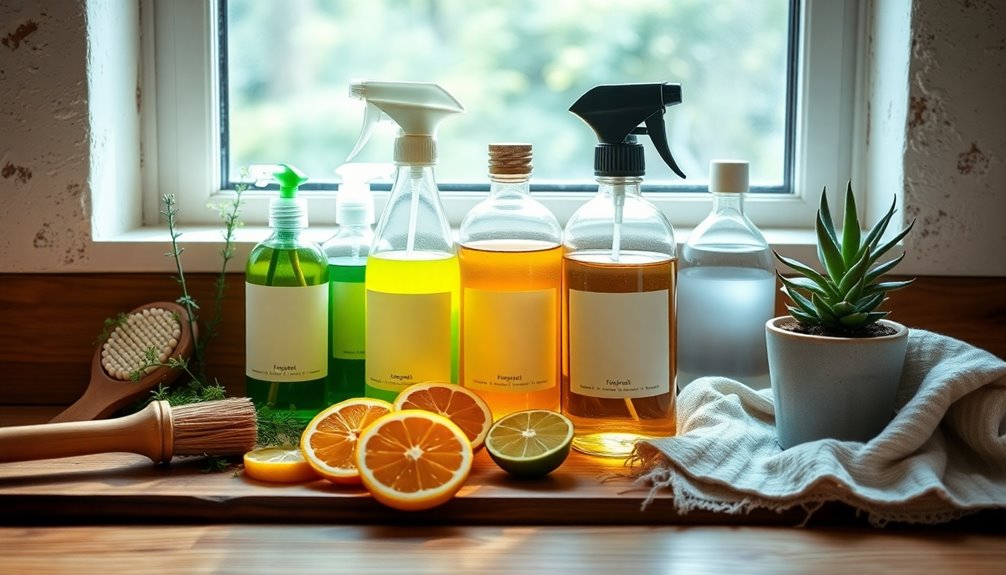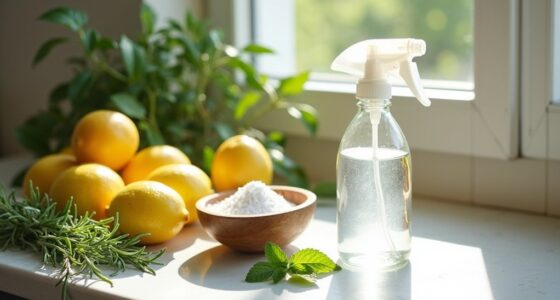Choosing eco-friendly cleaning products is a smart way to protect your health and the planet. You'll find options like plant-based laundry detergents that work effectively without harmful chemicals. Look for biodegradable ingredients and non-toxic formulas that improve indoor air quality. Many products come in recyclable or refillable packaging, reducing plastic waste. Brands like Grove Collaborative offer convenient refill kits, while DIY recipes let you create your own cleaners using simple ingredients like vinegar and baking soda. Discover more about the types of products and how to select the best options for a cleaner, greener home.
Key Takeaways
- Eco-friendly products reduce pollution and improve indoor air quality by using biodegradable and non-toxic ingredients.
- Look for sustainable packaging and certifications like Green Seal to ensure environmental responsibility.
- Key ingredients include plant-based surfactants, essential oils, and natural acids that effectively clean without harsh chemicals.
- Consider reputable brands like Grove Collaborative and Blueland that offer refillable and zero-waste options.
- DIY cleaning solutions using common household items like vinegar and baking soda are effective and eco-friendly alternatives.
Why Choose Eco-Friendly Products
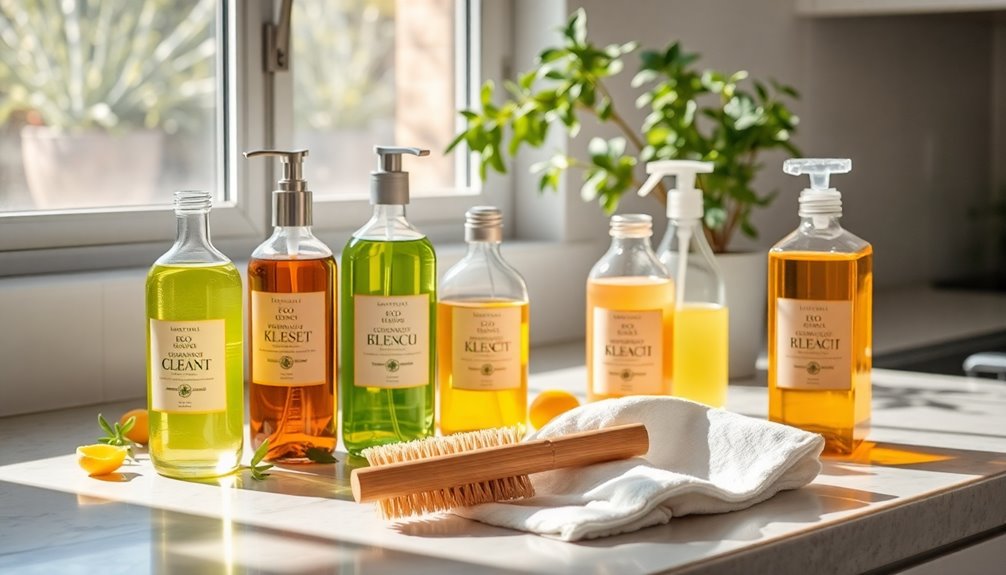
Choosing eco-friendly cleaning products is a smart move for both your health and the planet.
These products significantly reduce pollution, protecting waterways and aquatic life with their biodegradable ingredients. By opting for eco-friendly options, you also lower your carbon footprint, as many are produced through sustainable practices. Additionally, many eco-friendly products support renewable resources, much like how wood stoves utilize sustainable wood fuel.
You'll find that they often come in recyclable or biodegradable packaging, cutting down on plastic waste.
On top of environmental benefits, these products minimize your exposure to harsh chemicals, improving indoor air quality and reducing the risk of skin irritations and allergies.
While they may seem pricier initially, you'll likely save money in the long run due to their effectiveness and reduced health-related expenses. Their ability to improve indoor air quality is reminiscent of how properly maintained wood stoves can enhance air quality by reducing harmful emissions.
Key Factors to Consider
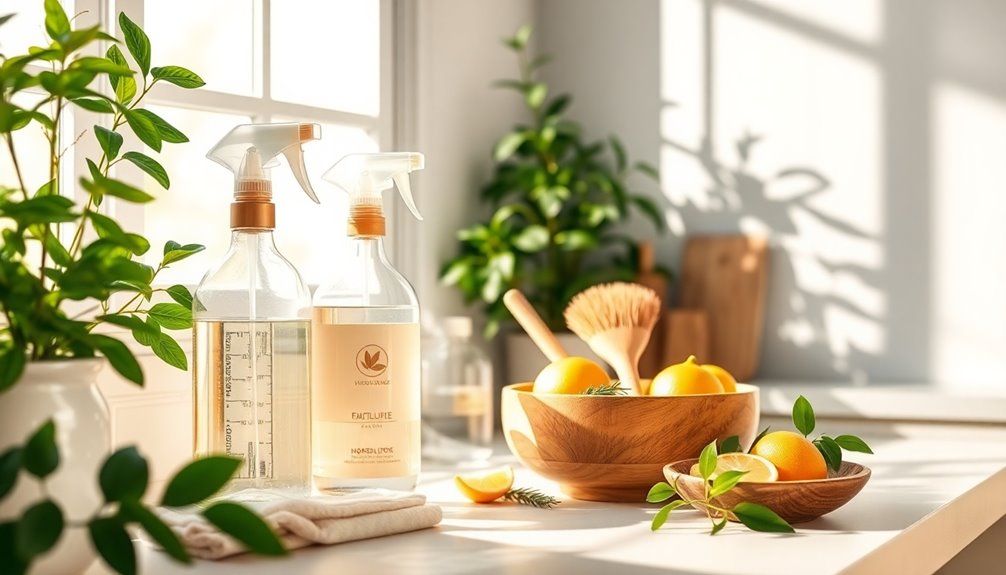
When selecting eco-friendly cleaning products, what should you prioritize? First, consider biodegradability. Choose products that break down naturally, protecting waterways and soil. Look for certifications like Green Seal to ensure they meet these standards. Additionally, using eco-friendly alternatives helps reduce your carbon footprint and promotes sustainability. Essential oils can serve as natural antibacterial agents that enhance the cleaning power of your products.
Next, focus on non-toxicity. Ensure the product's free from harmful chemicals and check for low VOC content. Transparency in ingredient lists is key—avoid hidden toxins.
Also, seek cruelty-free and vegan options. Avoid brands that test on animals or use animal-derived ingredients. Certifications like PETA-approved can help guide your choices.
Finally, think about packaging. Opt for minimal, recyclable, or refillable options to reduce waste. Supporting products with sustainable packaging reduces your environmental impact further.
Keep these factors in mind for effective eco-friendly cleaning!
Eco-Friendly Ingredients
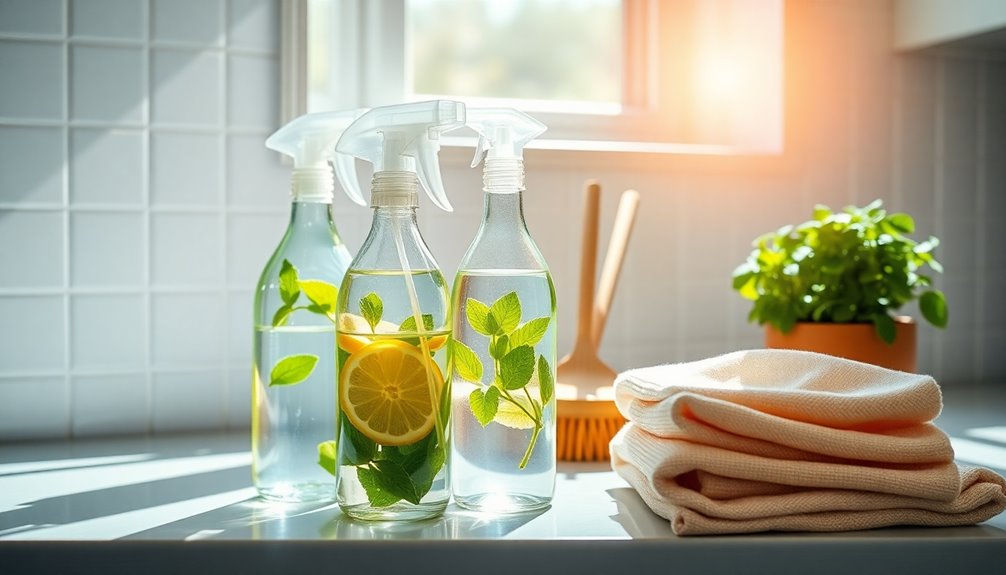
Eco-friendly cleaning products rely on natural ingredients that effectively clean while minimizing environmental impact.
Plant-based surfactants, derived from renewable resources like coconut or palm oil, break down dirt and grime without harming the environment. Essential oils not only offer pleasant scents but also provide antimicrobial properties that kill germs naturally; for instance, tea tree oil is known for its antibacterial properties and can enhance cleaning efficacy.
Natural acids, such as vinegar and lemon, disinfect surfaces and tackle bacteria efficiently. Additionally, natural enzymes act as biological catalysts that enhance stain removal and are safe for both people and pets. Furthermore, natural ingredients contribute to cleaning efficacy by effectively removing dirt and grime.
Finally, natural preservatives like sodium benzoate help extend the shelf life of your cleaning products without introducing harsh chemicals.
Types of Cleaning Products

There are various types of eco-friendly cleaning products designed to meet the needs of every cleaning task in your home.
All-purpose cleaners are versatile and effective on multiple surfaces, using natural ingredients to avoid harsh residues. These cleaners often come in eco-conscious packaging that minimizes environmental impact.
Dishwashing detergents are phosphate-free and biodegradable, ensuring safe cleaning for your dishes.
For laundry, plant-based detergents are gentle on fabrics and free from artificial dyes.
Bathroom cleaners harness natural ingredients like vinegar for effective disinfection while being non-toxic.
Floor cleaners use plant-based components and essential oils for a fresh finish.
Lastly, window and glass cleaners remove smudges without ammonia, keeping your surfaces clear and safe.
Each type prioritizes your health and the environment, making your cleaning routine sustainable.
Brands and DIY Options
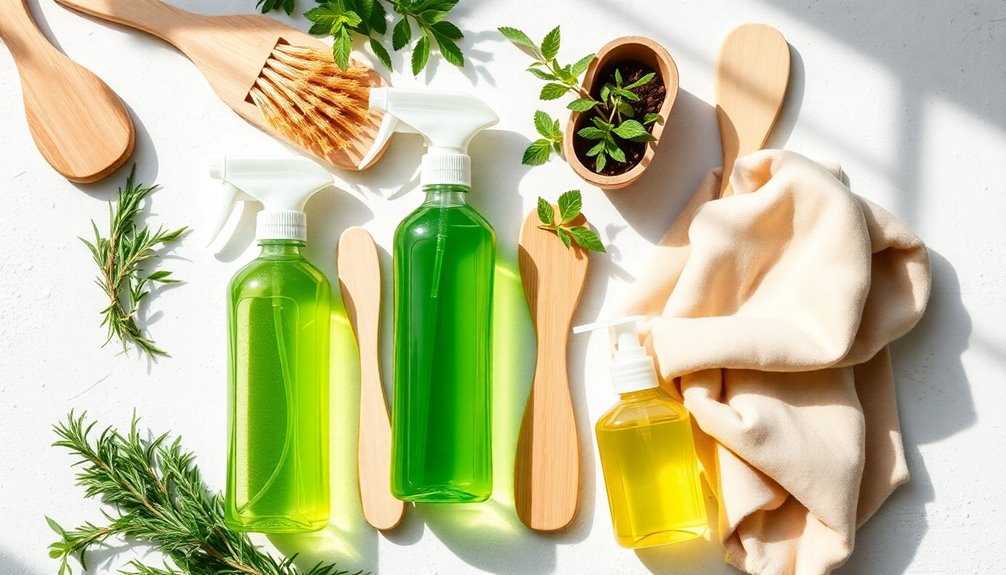
While exploring eco-friendly cleaning options, you'll find a mix of reputable brands and easy DIY recipes that cater to your cleaning needs. Brands like Grove Collaborative and Blueland offer sustainable solutions, with plastic-neutral packaging and refillable kits. Additionally, many of these brands are B Corp certified, ensuring they meet rigorous social and environmental performance standards. Branch Basics focuses on biodegradable concentrates, while Package Free emphasizes zero-waste products.
For DIY enthusiasts, simple recipes can be made using ingredients like baking soda for deodorizing, distilled white vinegar for tackling alkaline substances, and hydrogen peroxide as a bleach alternative. Lemon juice cuts through grease, and essential oils like tea tree and lavender add disinfectant properties.
With these brands and DIY options, you can effortlessly maintain a clean, eco-friendly home.
Frequently Asked Questions
Are Eco-Friendly Cleaning Products More Expensive Than Traditional Ones?
Are eco-friendly cleaning products more expensive than traditional ones?
You might find that they often come with a higher price tag due to quality ingredients and certifications.
However, their concentrated formulas mean you use less product, potentially saving money long-term.
Plus, they're designed to last longer and reduce waste.
While the initial cost might be higher, the long-term value and health benefits often outweigh the price difference.
It's a smart investment!
How Can I Store Homemade Eco-Friendly Cleaning Products Safely?
Imagine opening a cabinet and finding your homemade cleaners shimmering in glass containers, all neatly labeled.
To store them safely, use air-tight glass containers, keeping them in a cool, dark place.
Shake well before each use, and always check for any changes in color or smell.
Remember to keep essential oils out of reach of children and pets.
With these simple steps, you can ensure your eco-friendly cleaning products stay effective and safe.
What Is the Shelf Life of Eco-Friendly Cleaning Products?
The shelf life of eco-friendly cleaning products varies, but generally, all-purpose cleaners last about two years, while liquid laundry detergents typically last six months.
Dish soap and disinfectant wipes usually last one year.
Factors like storage conditions, ingredients, and frequency of use can affect longevity.
To maximize shelf life, store products in a cool, dark place, use opaque containers, and consider making smaller batches to keep them fresh longer.
Can Eco-Friendly Products Be as Effective as Traditional Cleaners?
Absolutely, eco-friendly products can be just as effective as traditional cleaners.
You'll find that many plant-based formulas break down dirt and bacteria effectively, often outperforming conventional options on organic stains.
By utilizing natural ingredients like vinegar and citric acid, you can tackle tough grime without harmful chemicals.
Plus, advancements in green chemistry ensure these products are efficient and safe for both your home and the environment, giving you peace of mind while cleaning.
Are There Any Eco-Friendly Cleaning Products Specifically for Sensitive Skin?
If you've got sensitive skin, finding the right eco-friendly cleaning products is like searching for a needle in a haystack.
Thankfully, options like Attitude's Fruit & Vegetable Wash and Biopuro's Universal Orange Oil Surface Cleaner are hypoallergenic and free from harsh chemicals. They use botanical and mineral ingredients, ensuring your skin stays happy while you clean.
Plus, these products are biodegradable, making them gentle on both your skin and the planet.
Conclusion
By choosing eco-friendly cleaning products, you're not just doing your part for the planet; you're also creating a healthier home. With a little research, you can easily find brands and DIY options that fit your needs. Remember, every small step counts, and as they say, "a drop in the bucket" can lead to significant change. So, roll up your sleeves, dive in, and make cleaning a greener, more sustainable experience for you and your family!
